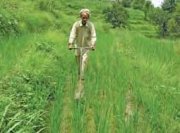International Crops Research Institute for the Semi Arid Tropics (ICRISAT)
Lessons from non-chemical input treatments based on scientific and traditional knowledge in a long-term farming experiment - A research paper
Posted on 19 Apr, 2011 12:32 AM
Two of the four systems are low-cost farming methods which are based on traditional and scientific knowledge on using crop residues, farm-waste, compost, Gliricidia lopping, bacterial inoculants, and herbal extracts as nutrients to nourish the soil, and as biopesticides to manage pests.
The third system is conventional agriculture which is the "control" and receives chemical input as suggested by research institutions depending on crop type. The fourth is a combination of the first three.
Evaluation of crop production systems based on locally available biological inputs - A research paper (2006)
Posted on 14 Apr, 2011 01:28 AMHere the yields of crops grown by low-cost inputs including plant biomass are compared with chemical fertiliser-induced production.
The study was conducted over 1999-2004, and the findings conclude that the yields of low intensive biological farming are as good, if not better than chemical fertiliser intensive farming.
Farmers experiences on System of Rice Intensification in India – A report by ICRISAT-WWF
Posted on 14 Dec, 2010 08:29 PM This report on farmers’ experiences on System of Rice Intensification (SRI) in India by ICRISAT and WWF is an effort to compile the experiences of those farmers who pioneered the SRI method in various regions. They experimented in their own way, articulating their point of view on the method.
This report on farmers’ experiences on System of Rice Intensification (SRI) in India by ICRISAT and WWF is an effort to compile the experiences of those farmers who pioneered the SRI method in various regions. They experimented in their own way, articulating their point of view on the method.
The SRI is a national phenomenon in India and rice-cultivating farmers, particularly those who have less than one hectare of land, have experimented, refined, adopted and are promoting SRI. It is their hard work and trust that has spread this unknown method into all rice-growing states. Out of 564 rice-growing districts in India, SRI is being practiced by the farmers in about 216 districts.